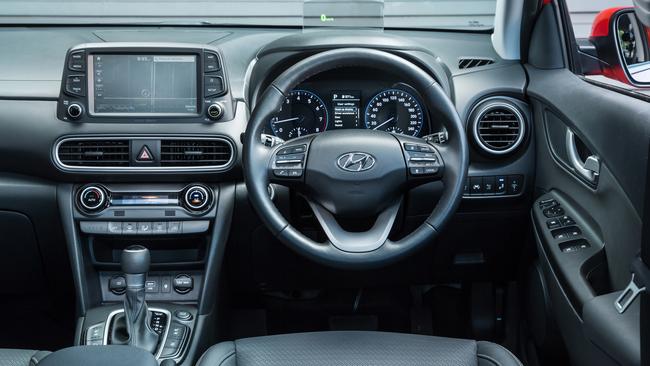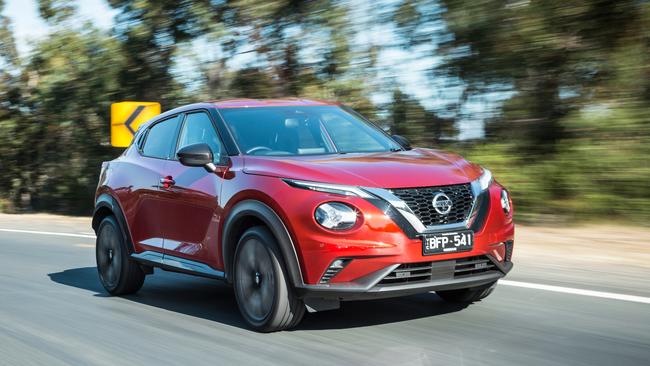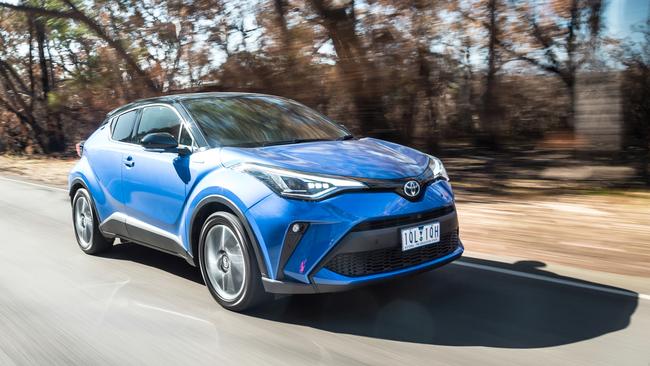Small SUV comparison: Nissan Juke v Toyota C-HR v Hyundai Kona
SUV sales are booming in Australia and we compare three of the best new small high-riders to see which is worthy of your hard earned cash.

car advice
Don't miss out on the headlines from car advice. Followed categories will be added to My News.
No one could accuse the Nissan Juke of being plain.
Now the entry point to the Nissan range, the Juke’s instantly recognisable caricature face has a new edge for 2020, giving the brand fresh ammunition in the fight for small SUV buyers.
We pit it against two rivals that also sell on sharp looks.

HYUNDAI KONA
As with Nissan, Hyundai has dumped small passenger cars from its range in favour of high-riding crossovers. Nissan provided its top-grade Juke for review, which shifts Hyundai customers out of its entry-level Venue and into the bigger Kona.
Priced from about $40,500 drive-away in well-equipped Highlander form, the Kona is well-stocked with heated and cooled leather seats, wireless phone charging, climate control, smart keys, LED headlights and more. As with the Juke and C-HR, it has an 8-inch central infotainment screen with Android Auto and Apple CarPlay, along with satnav and front and rear parking sensors.

All three cars have active cruise control, auto emergency braking, blind-spot warning and rear cross-traffic alert systems. Hyundai makes do with a regular reversing camera, while the Toyota and Nissan have nifty 360-degree units.
The Kona is a little smaller than the Nissan or Toyota, with less leg room. Another concern surrounds its execution — perfectly presentable at its $26,500 entry point, the Kona feels a little basic at $40,000-plus, with materials that aren’t quite as plush.
That said, the Kona’s head-up display is a welcome addition, and it offers buyers the choice of front or all-wheel-drive and the option of a more powerful turbocharged engine.
The standard two-wheel-drive Kona goes well enough, thanks to a 2.0-litre, four-cylinder engine with 110kW of power and 180Nm of torque. Though it has a power advantage, the Kona’s non-turbo engine needs to be worked hard to deliver its best.

It’s also comparatively thirsty, officially requiring 7.2L/100km of petrol — two thirds more than the hybrid Toyota. Servicing splits the others at $1475 for five years.
The Hyundai is the heaviest car here, but disguises its weight well thanks to firm suspension keeping body roll to a minimum. Weighty, accurate steering lends confidence when cornering, though Hyundai’s taut approach can be uncomfortable on rough roads.
NISSAN JUKE Ti
The new Juke is the first model in a wave of new products set to revive Nissan showrooms in the next couple of years. A smash hit overseas, the Juke’s compact dimensions and funky looks have won fans around the globe.
The latest model is available with just one engine, a turbocharged 1.0-litre, three-cylinder unit that uses 5.9L/100km to make 84kW and 180Nm. Those aren’t big figures, but the Juke’s 200 kilogram weight advantage helps it feel spritelier than expected.

The downside is a seven-speed automatic transmission that can feel jerky at times, struggling to choose the right ratio in hilly country.
We tested the Juke in range-topping Ti form which brings 19-inch wheels with low-profile tyres. Its ride felt busy on broken surfaces, making the Juke the least comfortable of our trio. There’s also more side-to-side movement than we’d prefer, and enthusiasts won’t like an “active trace control” feature that can second-guess cornering inputs.

But it has the best cabin by some margin, an attractive space trimmed with leather and Alcantara. An eight-speaker Bose stereo includes speakers mounted in the front headrests, lending immersive sound rare at this price point. On sale for a sharp $39,490 drive-away, the Nissan is a little dear to service at $1889 for five years.
Rear seat space is a little tight compared to the C-HR, though folks in the back will enjoy the presence of a USB power outlet, along with a spacious boot offering plenty of room for luggage.
TOYOTA C-HR KOBA HYBRID
Toyota’s “Coupe-High Rider” is great to drive, with quick steering and well-sorted suspension tune. It’s the lowest-riding car of this group by some margin, which lends car-like poise but cruels any hope of rough country exploration.
Then again, all three lack a proper spare wheel, limiting their off-road ability.

The Toyota feels precise, agile and refined, helped by strong and quiet hybrid power.
Boasting 90kW of combined grunt from its electric motor and 1.8-litre petrol engine, the Toyota is easily the most refined proposition on the road.
As an added bonus, fuel use is a best-in-class 4.3 litres of petrol for every 100 kilometres of travel.
Servicing is also unusually cheap at $1000 for five years.
The catch is Toyota’s hybrid engine is only available on the top-spec C-HR Koba, making it the dearest car here at a little more than $41,000 drive-away.
As with its rivals here, the C-HR Koba is jammed with kit including a comprehensive safety suite, climate control and LED headlights.

A mid-life update recently introduced Apple CarPlay and Android Auto connectivity, along with a bigger 8-inch touchscreen.
Front occupants are well catered for in the Toyota, which places the driver low in the car on supportive seats, surrounded by an interesting diamond-like pattern on the doors and roof.
But poor over-the-shoulder vision will compromise its appeal to some, and the back seat’s high window line isn’t suited to kids.
High-mounted exterior door handles may also prove difficult for little ones.
Another downside is the smallest boot of the group (though 318 litres is adequate for most purposes) and hardware that isn’t ready for towing.
Beyond that, the back seat is roomier than you might expect from the car’s rakish lines.

VERDICT
Hyundai’s Kona is convincing at lower price points, but outgunned here by better executed machines. The Juke is one of Nissan’s better efforts, but the Toyota is the pick of the bunch. It is refined on the road, cheap to run and loaded with features.
TOYOTA C-HR KOBA HYBRID VITALS
Price: About $41,000 drive-away
Engine: 1.8-litre 4-cyl hybrid, 90kW (combined)
Warranty/servicing: 5yrs/u’ltd km, $1000 for 5 yrs
Safety: 5 stars, 7 airbags, auto emergency braking, active cruise, lane keeping assistance, blind-spot monitoring, rear cross-traffic alert
Thirst: 4.3L/100km
Cargo: 318L
Spare: Temporary
NISSAN JUKE Ti VITALS
Price: From $39,490 drive-away
Engine: 1.0-litre 3-cyl turbo, 84kW/180Nm
Warranty/servicing: 5yrs/u’ltd km, $1889 for 5 yrs
Safety: 5 stars, 6 airbags, auto emergency braking, active cruise, lane keeping assistance, blind-spot monitoring, rear cross-traffic alert
Thirst: 5.9L/100km
Cargo: 422L
Spare: Temporary
HYUNDAI KONA HIGHLANDER VITALS
Price: About $40,500 drive-away
Engine: 2.0-litre 4-cyl, 110kW/180Nm
Warranty/servicing: 5yrs/u’ltd km, $1475 for 5 yrs
Safety: 5 stars, 6 airbags, auto emergency braking, active cruise, lane keeping assistance, blind-spot monitoring, rear cross-traffic alert
Thirst: 7.2L/100km
Cargo: 361L
Spare: Temporary
Originally published as Small SUV comparison: Nissan Juke v Toyota C-HR v Hyundai Kona
